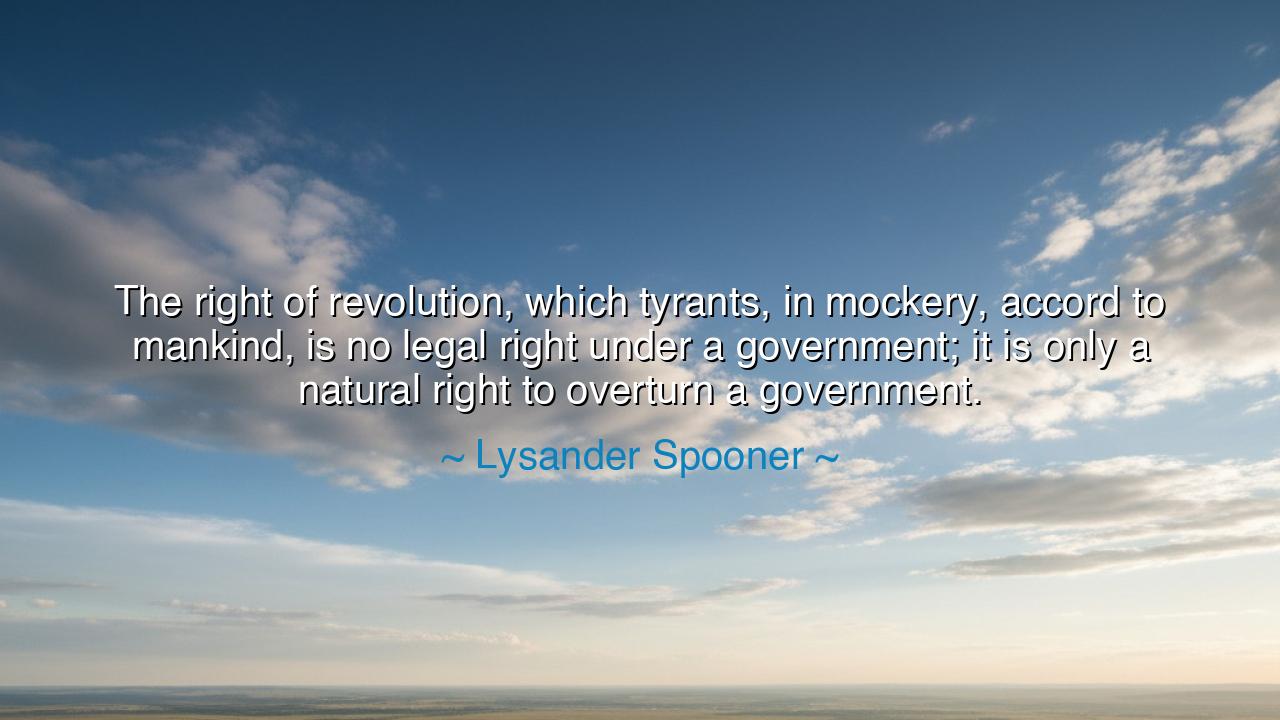
The right of revolution, which tyrants, in mockery, accord to
The right of revolution, which tyrants, in mockery, accord to mankind, is no legal right under a government; it is only a natural right to overturn a government.






Lysander Spooner, the fierce 19th-century individualist and philosopher, spoke as one who saw freedom not as a gift granted by rulers, but as the unyielding birthright of the human soul. When he declared that "The right of revolution... is no legal right under a government; it is only a natural right to overturn a government," he stripped away the illusions that tyranny hides behind. In these words burns the eternal flame of liberty — the reminder that the power to resist oppression is not a permission written in law, but a fire born in the conscience of humankind. No government, no constitution, no king can confer it; it flows from the same source as breath and blood — from nature itself.
In the ancient sense, Spooner spoke as the philosophers of Greece or Rome might have spoken: he placed natural law above legal decree. To him, the tyrant’s offer of a “legal revolution” was mockery, for no oppressor ever drafts the paper that frees his slave. The law, he argued, is often but the weapon of the powerful, wrapped in the cloth of justice. The true right of revolution belongs not to courts or statutes but to men and women whose hearts refuse submission to injustice. It is the voice of life itself shouting through chains, the cry that says: Enough!
Look to history, and you will see this natural right written in blood and courage. When the people of America rose against the crown of England, there was no law granting them the right to rebel. The Declaration of Independence was itself an act of treason under the laws of that time. Yet, in their defiance, they appealed not to legality but to Nature’s God, to the belief that when government becomes destructive of liberty, it is the right of the people to alter or abolish it. Thus, revolution was not lawful — it was moral, necessary, and sacred. It was the spirit of Spooner’s words made flesh through the thunder of cannons and the ink of conviction.
In France, too, the oppressed rose against monarchy, declaring that sovereignty rests in the people. The law said they were criminals; history called them revolutionaries. The guillotine and the barricade were not instruments of legality — they were symbols of natural reclamation. The world trembles when the people remember that their power does not come from the consent of rulers, but from their refusal to be ruled unjustly. This is the truth that tyrants fear most: that their palaces stand only as long as the people forget what is already theirs.
Spooner’s words are not the call of chaos, but of conscience. He reminds us that the law is not sacred when it betrays justice, and that obedience is not virtue when it defends oppression. A people who mistake legality for morality will bow to every chain so long as it bears a seal. But a people who understand that the natural right of freedom precedes every written law — such people will rise again and again until the world remembers its dignity. In this lies the essence of revolution: not destruction for its own sake, but the restoration of balance, the rebirth of humanity’s covenant with truth.
The lesson, then, is clear: never let the language of law dull your sense of right. Laws are but tools — they may serve liberty, or they may bind it. When they serve tyranny, they lose their authority. To live justly is to honor natural law, which says no human being is born to kneel. It is to recognize that revolution begins not with muskets, but with the courage to say no to injustice — in your work, your community, your nation, your heart.
So, my listener, carry this teaching as a torch through the ages: cherish peace, but never worship legality when it mocks justice. Freedom is not bestowed — it is claimed. And when those who rule forget that they are but servants of the people, then, as Spooner wrote, it becomes not only our natural right, but our sacred duty, to overturn them. Thus, the cycle of liberty renews itself, as the old order crumbles and humanity stands once more — free, proud, and unafraid beneath the eternal law of nature.






AAdministratorAdministrator
Welcome, honored guests. Please leave a comment, we will respond soon